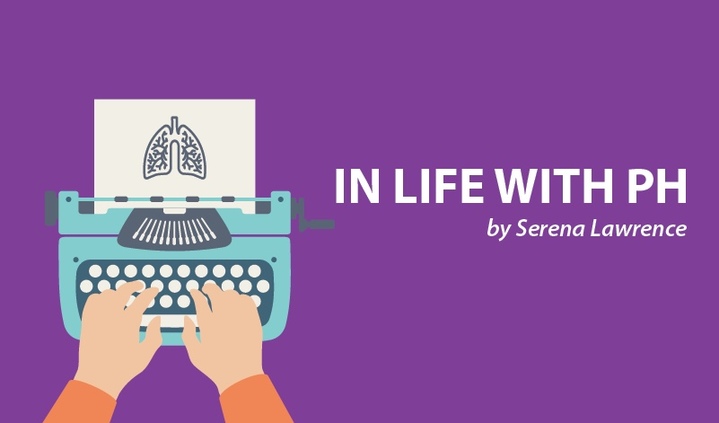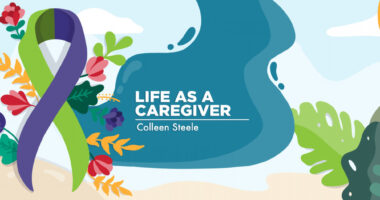Thoughts About Life Expectancy and Hope


I’ve previously discussed the moment that a pulmonary hypertension (PH) specialist waltzed into an examination room and slapped an expiration date on my back like a carton of milk. Unfortunately, this day probably will be etched in my mind forever. I was so dumbfounded that I asked “Five years to what?” when he came in and told me I had “about five years left, 10 if I was lucky.” It was at that point that my doctor had to explain to me that pulmonary hypertension is considered a fatal disease.
I will spare you the details of the tears that followed, along with my doctor wanting to put me on suicide watch. Did I mention I did not handle the news well? No? Well, I didn’t handle the news well. I had my heart cath a few days later, and a nurse had to stay with me in the recovery room because my patient file said I was a suicide risk. Did I mention that this was on Christmas Eve? PH: The gift that keeps on giving.
In the years following my diagnosis, I have looked high and low trying to find a glimmer of hope when it comes to life expectancy. Although PH is a progressive and incurable illness, I have learned that just like any illness, every patient is unique. While statistics help to show how devastating PH is as a whole, I try to remind myself of some of the things I have learned about life expectancy as a PH patient.
Here are a few pointers I wish I knew upon my diagnosis:
• Facts and figures: Statistics are about other people, not about you. (Seriously, ask anyone who has ever taken a statistics class!) It is an average collected from people who most likely are very sick, so obviously the statistics that are available are not exactly comforting to those of us with PH.
However, it also is important to remember that a lot of statistics about PH and survival are out of date. Several new medications for PH have been introduced in the past couple of years. As newer medication becomes available, the future becomes unknown. Simply put, we don’t have long-term data on how newer medications may impact (or improve) survival.
• New treatment options: I have seen the introduction of several new PH medications since my diagnosis about three-and-a-half years ago. (Unfortunately, because I live in Canada, I do not have access to the majority of these medications.) New treatment options are exciting because as we gain more knowledge about a disease, more effective and less invasive medications can be developed.
As someone who grew up in the ’90s, I remember when diseases like HIV were considered terminal. However, thanks to advancements in medicine, the life expectancy for HIV patients in North America are near normal with treatment. I know that HIV and PH are two very different diseases, but I use this as an example to show how survival can be impacted when medical breakthroughs happen.
I once had a doctor tell me that I was diagnosed with PH at the right time because we are on the cusp of big breakthroughs. I truly hope that is the case, and that we all have access to these breakthroughs (regardless of our ZIP code or income) once those treatments become available.
• Long-term survivors: Many of the support groups that I joined online reinforced the idea that a long-term survivor was anyone who has lived with PH for seven years or more. (As someone who was diagnosed with PH her 20s, seven years does not sound long enough.) Through support groups, I was able to befriend long-term survivors who not only survived seven years past their diagnosis, but 20 and 40 years past it.
Many of these fellow PHers were given a life expectancy that they have outlived. In fact, a handful of them were told they had a few hours to live and would not be leaving the hospital alive. If you are looking for some stories of hope, I would recommend reading PHighter Friday stories written by Carolyn, Donna, and Jeannette, whom I interviewed on my old blog, “The PHight or Flight Project.”
I started interviewing fellow PH patients after my diagnosis because I wanted this information to be available to other patients, families, and doctors. Statistics may paint a different a picture for survival, but it is important to remember there are exceptions to every rule. We are all unique and, as such, we all will have different responses to diseases and treatments. Of course, this kind of survival doesn’t happen nearly enough (otherwise statistics wouldn’t be so scary), but I truly hope to see more of us experience these kinds of out outcomes as research and treatments improve and broaden.
Maybe hope is out there
As someone who has PH, I understand how scary it can be to be given a life expectancy or read about it online. Being a young adult and knowing that it is statistically unlikely I will live past my 30s has certainly changed the course of my life.
While I believe it is important to be realistic, I also believe it is important to remember how unique every patient is. Simply put, my future remains unwritten — and that fills me with a lot of hope.
You can follow me at my personal website worship-and-tribute.com
***
Note: Pulmonary Hypertension News is strictly a news and information website about the disease. It does not provide medical advice, diagnosis, or treatment. This content is not intended to be a substitute for professional medical advice, diagnosis, or treatment. Always seek the advice of your physician or other qualified health provider with any questions you may have regarding a medical condition. Never disregard professional medical advice or delay in seeking it because of something you have read on this website. The opinions expressed in this column are not those of Pulmonary Hypertension News or its parent company, Bionews Services, and are intended to spark discussion about issues pertaining to pulmonary hypertension.








Dave
Serena: Just want to say Thank You for this piece of writing. I was just diagnosed February 17,2017 I'm 62 years old now. But my point is they told me 2-5 years. I have a lot to do yet so I hope there wrong. But again thank you ??
Serena Lawrence
Thank you for reading and sharing a bit about yourself with me. I am sorry to hear about your recent diagnosis. I found the first little bit after diagnosis especially challenging. Hold on to hope! Best wishes to you.
Michelle
I resonate with you Dave.
I am still awaiting diagnosis. I had a VQ scan in Jan/17 with CTEPH the tenative diagnosis. The results were shared with me over the phone & perhaps if I was eligible, I could have surgery. It wasn't much relief. I was told I would be referred to the PH specialty clinic. I knew only a little bit about PH at that point. I then read the 2-5 yrs mortality rate. WHAT... Mortality rate?!
I lived for several mo.s trying not to read anything more, not to talk about it, just in limbo... numb from trying not to overthink or jump to the wrong conclusion.... maybe it will be the wrong diagnosis. I would await the PH clinic appt.
I have always believed I am here for a purpose - not a death sentence.
I'm 48. I am a wanderlust adventurer (trekking to Base Camp, Machu Pichu, kayaking with sea turtles, Mtn biking the Moab... ). Unfortunately, my list now includes walking the dog at snail pace, pacing my energy & breathe so I am able to climb our stairs to bed at the end of my day.
BUT.. the past month I decided I can't live in limbo or be miserable. I'm aware that I've been 'rare' all of my life.There HAS to be more for me! More options of treatments, nutrition, mindfulness... goals & joy!
I found a few FB pages/groups & have been reading literature/ studies that align with a much longer LIFE option :)
The past month I have readjusted my attitude. I am working to see the positive side of things, living presentely, laughing more & practising a lot of mindfulness.
To Dave - thank you .. to read I am not alone at the beginnning of my journey!
To Serena - Thank you again for sharing more about your journey (from your beginning) - very timely. Your insights have been helpful for my change in perspective ?.
I appreciate your candidness.
Serena Lawrence
Hi Michelle,
I understand how difficult it can be when a disease takes hobbies and things we truly enjoyed away from us. I am glad to hear how you have been actively working to changing your perspective (something that is not easy to do!) While having a positive attitude may not make it easier to go up a flight of stairs, it gives us the power to enjoy today and right now more fully.
Best wishes to you!
mike
i was diagnosed at 28. my 48th birthday is next week. 4 kids, 2 dogs, one wife (i'm divorced & remarried), 3 homes, and 5 PH treatment plans later, things still look pretty good. Keep the faith. new discoveries are coming monthly. when i was diagnosed, I was given 3-5 years and put on flolan as a "bridge to transplant". 20 years later, i'm still running on all original parts. and I'm not even on a transplant list anymore.
Serena Lawrence
Hi Mike!
Happy early birthday!
Thank you so much for sharing a bit about yourself. It is always hopeful to hear from long-term PH survivors. I am glad to hear you are still running on all your original parts.
Best wishes!
Gary
Hey, I too was diagnosed in December. It was December 23, 2014, when a lung transplant Dr. Dr.Cynthia Gries came in to tell me all about PH, the medicine they were putting me on, and told me if I follow her plan, and take my meds as directed, we would not meet again within the next couple years. The hospital Dr. told me if I survived the first year, then I could look forward to the next four years. So, yes PH is the gift that goes on giving. Thank You, for writing, you do offer hope to those that read it. Breath well.
Serena Lawrence
Hi Gary,
I have spoken to so many PHriends who were diagnosed on near or on a special holiday, or their birthday. Considering all the days in the year...it is kind of uncanny that it seems to happen so often.
Thank you for reading and taking the time to comment. Breathe well, my friend.
Best wishes!
Diane
My name is Diane. I am one of those people who have been diagnosed for 40 plus years. I was born with a heart defect(ventricular septal defect) that went unrepaired because Drs did not know what to do. At the age of 21 I was put on Coumadin and told I may have 10 years to live. After 25 years of being on Coumadin and still living I was introduced to Tracleer and have taken a gamut of PH drugs since then. I was also evaluated for a Heart and lung transplant that never happened and am now on the inactive list. When I retired from my job( after 25 years) I was again told I had 10 years to live. I am now 65 years old, with a husband, 2 adopted daughters and 5 grandchildren. I take three pulmonary hypertension drugs and living a good life. Where there is life, there is hope!
Serena Lawrence
Hi Diane,
Thank you so much for sharing, it really is incredible to hear from long-term survivors. I'm so glad to hear that you are a grandmother now! Thank you for sharing a little bit of your hope with me.
All the best,
Serena
Susan Zucal
Such a great blog. I am a nurse who works with PH patients and in the past 10 years I have seen so many advancements in treatment. People diagnosed with OH need to know there is hope and treatment. Life can be very good. Thank you for your blog.
Susan Zucal
Serena Lawrence
Hi Susan,
Thank you so much for reading, and for providing care to other PH patients. It means a lot to me that a nurse would be willing to read about a patient's perspective.
Many thanks,
Serena
Lesley Allnutt
I think survival rate depends on what stage the PH has reached at time of diagnosis. Someone whose PH is level 4 is obviously not going to survive as long as someone whose PH is only a level 1.
I personally would like to be told what my expected survival time is so that I can make a plan for my future. Those of us who ask to be told, should be told. I have had level 3 PH for about 5 years and no-one has mentioned the dreaded prognosis word. I don't like being treated like a baby, I WANT to know.
Serena Lawrence
That can be an indicator when considering survival, however, all of the long-term survivors that I referred to in my post were diagnosed at a class 4.
Caroline Dunbar
Sensitive and eloquent summary of life with PH. Thank you for sharing your story and keeping it upbeat. Your brilliant philosophy is life affirming and that's just what the newly diagnosed need.
Dawn
Hello Serena
Thanks for your positive insight on PH.
I was Diagnosed 15 months ago, tried oral meds then inhaled with oral. didn't work out. That being said, now i'm on IV meds. doing a lot better now. I was class 3 on my way to 4 or worse.
This is a scary disease period. but I have HOPE ! and pray for anyone dealing with this condition to have Faith and not give up.
When the specialist tells you, that you need IV therapy now ! don't roll the dice, it can save your life.
Breathing easy is sooo much better !!!!!
Melissa Dumitru
Thanks for this great article Serena, its very relevant and important that people know this from the actual people living with this disease. As a ten year survivor, and one who has been terminal four times with hours to live in this time period, I want to assure others that there is always hope. Your article touches on some very important facts, such as the developments in medications etc.. nicely written.